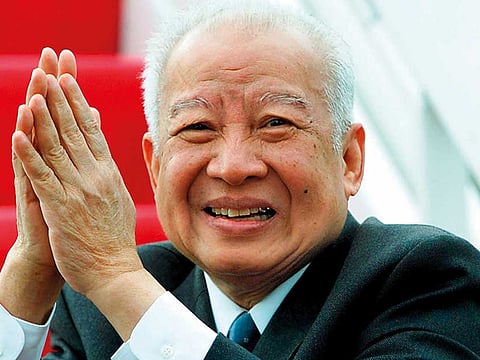Today in History: May 22,1993 — Sihanouk returns to Cambodia
Prince Norodom Sihanouk flew home to a Cambodia still suffering political assassinations, ambushes and shelling on the eve of the country’s first multiparty election in decades

1993 - Head of state Prince Norodom Sihanouk flew home to a Cambodia still suffering political assassinations, ambushes and shelling on the eve of the country’s first multiparty election in decades. “They need me,” the former king said of his people, who have suffered authoritarian rule, bloody revolutionary experimentation, American bombing, Vietnamese invasion and civil war — all since the late 1960s.
On the day of Sihanouk’s return from a Beijing holiday, a supporter of the royalist party run by one of his sons, Prince Norodom Ranariddh, was murdered in the village of Sanday, 15km north of Siem Reap in northern Cambodia. Dozens of royalists have been assassinated in the months leading to the election and UN officials blame most of the killings on the ruling Cambodian People’s Party (CPP) of Prime Minister Hun Sen.
The CPP is expected to take in the most votes. The Khmer Rouge put Cambodia through a Maoist revolution in the 1970s that killed a million people through execution, starvation, disease and forced labour.
Other important events
1819 The American steamboat Savannah makes its first trans-Atlantic crossing.
1822 US and Korea sign a treaty of peace and friendship.
1840 Transportation of British convicts to New South Wales officially ends.
1867 Canada becomes the first dominion of the British Empire.
1868 The ‘Great Train Robbery’ takes place near Marshfield, Indiana, led by Frank Reno.
1914 Britain acquires control of oil properties in the Gulf from Anglo-Arabian Oil Company.
1915 Three passenger trains collide due to a signalling error at Quintinshill, Scotland, killing 226 people.
1936 Aer Lingus, Ireland’s national airline, begins operating.
1939 Germany’s Adolf Hitler and Italy’s Benito Mussolini sign ‘Pact of Steel’.
1968 US Navy’s nuclear-powered submarine USS Scorpion sinks in the Atlantic in mysterious circumstances. All 99 crewmen on board were killed.
1972 Ceylon becomes the Republic of Sri Lanka as its Constitution is ratified.
1975 Rhodesia (now Zimbabwe) is expelled from the Olympics because of its racist policies.
1979 Hungary’s ruling Communist Party elects 57-year-old Prime Minister Karoly Grosz to succeed Janos Kadar as general secretary.
1985 A car bomb explodes in a Beirut suburb, killing 60 people and wounding 190 others.
1989 India successfully test-fires its first medium-range surface-to-surface missile Agni.
1990 North Yemen and South Yemen merge to form Republic of Yemen.
1994 Rwandan rebels capture the government army barracks in the capital Kigali.
1996 A second powerful bomb kills at least 14 people on a bus in Rajasthan, India.
1999 Former Sudanese dictator Gaafar Numeiri returns home from 14 years in exile.
2003 The United Nations votes to lift crippling sanctions imposed on Iraq in 1990.
2010 An Air India Express plane from Dubai crash-lands in Mangalore, India, killing 158.
2011 Defending world champion Sebastian Vettel wins the title in the Spanish Grand Prix.
2013 Dubai launches the Mobile Government initiative, marking a new era in the UAE’s development march.
2015 A suicide attacker detonates a bomb at a mosque in Saudi Arabia, killing at least 19 people.
2016 17 girls die in a fire at school dormitory in northern Thailand.
2017 The Enterprise Command and Control Centre, which brings control of different modes of transport under one umbrella, opens in Dubai.



